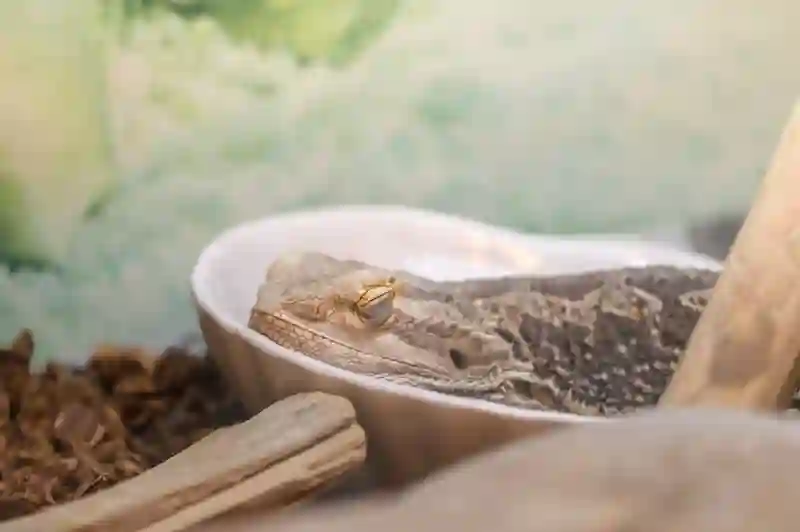If the environment is comfortable enough, bearded dragons can sleep outside of their cage.
However, they shouldn’t spend more than an hour or so outside of their enclosure.
To make sure they remain secure and at ease when they are not in their cage, it is crucial to keep an eye on them.
Although bearded dragons like to spend time outside of their cage, how often they actually want to depends on their character.
If they are left outside for an extended period of time, it is advised to keep them in their cage as little as possible and to provide a heating lamp.
Understanding Bearded Dragon Sleep Patterns
Bearded dragons are diurnal creatures, meaning they are active during the day and sleep at night. Their sleep patterns can vary, with some bearded dragons sleeping more soundly and for longer periods than others. The following factors can influence a bearded dragon’s sleep pattern:
- Age: Younger bearded dragons require more sleep than adults, as they are still growing and developing.
- Health: A healthy bearded dragon will typically have a more consistent sleep pattern than one that is unwell.
- Stress: High levels of stress can disrupt a bearded dragon’s sleep, leading to restlessness and irregular sleep patterns.
- Environmental factors: Temperature, lighting, and humidity can all affect a bearded dragon’s sleep quality.
The Importance of a Proper Sleeping Environment
A proper sleeping environment is crucial for the overall health and well-being of a bearded dragon. The following elements should be considered when creating an ideal sleeping space for your pet:
- Temperature: Bearded dragons require a temperature gradient within their enclosure, with a basking area of around 95-110°F (35-43°C) during the day and a cooler area of 70-75°F (21-24°C) at night.
- Lighting: Bearded dragons need a consistent day and night cycle, with 12-14 hours of light during the day and complete darkness at night. This can be achieved through the use of a timer on the enclosure’s lights.
- Hide spots: Providing a secure hideaway for your bearded dragon to sleep in can help them feel safe and reduce stress.
Can Bearded Dragons Sleep Outside of Their Cage?
While it is possible for bearded dragons to sleep outside of their cage, there are several factors to consider before allowing your pet to do so:
- Safety: Ensure that the room or area where your bearded dragon will be sleeping is secure, and free from hazards such as electrical cords, toxic plants, and other pets that could pose a threat.
- Temperature: It is crucial to maintain appropriate temperatures for your bearded dragon, even outside of their cage. Use a heat source, such as a ceramic heat emitter or under-tank heater, to create a warm spot for your pet to sleep.
- Sleep surface: Provide a comfortable and safe surface for your bearded dragon to sleep on, such as a soft towel or blanket. Avoid using materials that could cause injury or irritation to their delicate skin.
- Supervision: Always monitor your bearded dragon when they are sleeping outside of their cage to ensure their safety and well-being.
Tips for Allowing Your Bearded Dragon to Sleep Outside of Their Cage
If you decide to allow your bearded dragon to sleep outside of their cage, follow these tips to create a safe and comfortable environment sleep surface, and a secure hideaway. This will help your pet feel more comfortable and safe while sleeping outside of their cage.
- Monitor your bearded dragon’s behavior: Keep a close eye on your bearded dragon’s behavior when they are sleeping outside of their cage. If they appear restless, agitated, or stressed, it may be best to return them to their enclosure for a more secure and familiar environment.
- Maintain proper hygiene: Ensure that the designated sleep area is kept clean and free of debris, as bearded dragons can be susceptible to bacterial and fungal infections. Clean and sanitize the sleep surface regularly to minimize the risk of illness.
- Gradually increase the duration: If your bearded dragon is new to sleeping outside of their cage, start by allowing them to do so for short periods and gradually increase the duration as they become more comfortable and accustomed to the new environment.
The Benefits and Risks of Bearded Dragons Sleeping Outside Their Cage
There are potential benefits and risks associated with allowing your bearded dragon to sleep outside of their cage. It is essential to weigh these factors before making a decision.
Benefits:
- Bonding: Allowing your bearded dragon to sleep outside of their cage can help strengthen the bond between you and your pet, as they will associate you with a positive and comforting experience.
- Enrichment: Sleeping outside of their cage can provide your bearded dragon with a change of scenery and additional mental stimulation, which can be beneficial for their overall well-being.
Risks:
- Safety hazards: There is an increased risk of injury or harm to your bearded dragon when they are sleeping outside of their cage, as they may be exposed to potential hazards that are not present within their controlled enclosure.
- Stress: Some bearded dragons may feel stressed or anxious when sleeping outside of their cage, particularly if they are in an unfamiliar environment or if there are other pets in the household.
In conclusion, it is possible for bearded dragons to sleep outside of their cage, provided that their safety, comfort, and well-being are prioritized.

